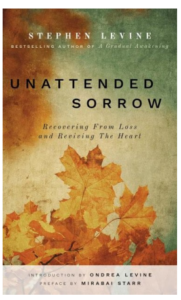Attending the Mindset of Loss
from Stephen Levine’s book, Unattended Sorrow

“Grief does not so much end as it does change in its intensity and duration. Our states of mind are constantly in flux, be they unpredictable sorrow, fear, love, sweet remembrance, loss or helplessness.
Uninvited sorrow cries itself to sleep. We rarely know all that we feel. States of mind arise uninvited, while random thoughts speak their mind
When we investigate our feelings instead of blindly following them, relating to them with mercy and mindfulness instead of only relating from them with fear and despair, we can glimpse the difference between freedom and bondage.
Investigation is a prime example of relating to a feeling or state of mind: noting its changing realities, how it feels in the body, how it keeps changing, “going through changes” in the mind, as it weaves through its constituent states, observing the fear, the doubt, the expectation, the disappointment, etc., that compose it, watching how fear may stimulate it and how mercy may pacify it. Anger, fear, doubt, sadness—all emotions, oppressive or otherwise—are a process, not a single state of mind. They are composed of constantly changing individual emotions. For instance, if we observe anger, which we’ve always believed to be a single state of mind, we find that it turns out to be a multi-leveled process: a moment of blocked wanting, of dissatisfaction, followed by a moment of frustration, followed by a rapid unfolding and looplike return through fear and pride and doubt and judgment and distrust, alternately shadow boxing and finger pointing, merciless with the world and ourselves.
Unresolved grief results from not only the loss of a loved one but also from the way that life roller-coasters between clinging for dear life and a hollowness in the pit of the stomach. Most of our resentments in life, no matter how guilefully disguised by the mind, are actually a grief reaction spawned from earlier feelings of loss. Most feelings of aversion most of those feelings of being ill at ease, of doubt, and of unwillingness to go further—are conditioned, even habituated, by a previous sense of safety lost. Indeed, we can see that even our tendency to judge others is an aspect of grief: a feeling of “not-enoughness,” which we long to be otherwise. Every moment of jealousy, confusion, or hatred arises from the belly of sorrow.
Though our various levels of grief may try to persuade us that it is fruitless, our healing lies in nonetheless allowing a merciful awareness to sink through the layers of our grief and explore what might lie beyond our pain. It may take being lost in the maze of feeling totally hopeless and helpless before we can eventually surrender our pain, open it to investigation and eventual healing. But what else can we do? What lies beyond the disquiet of simultaneously clinging to and condemning life is the spaciousness of the heart that becomes uncovered by a liberating awareness…”
